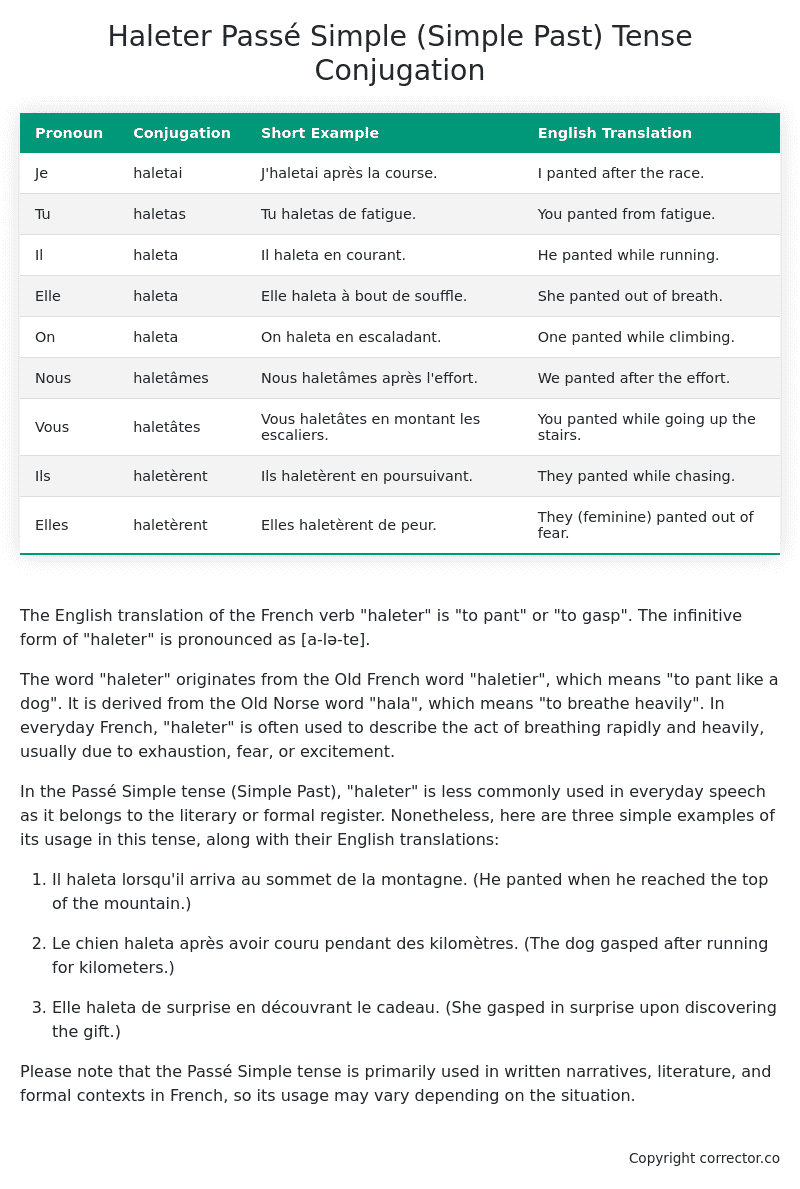Passé Simple (Simple Past) Tense Conjugation of the French Verb haleter
Introduction to the verb haleter
The English translation of the French verb “haleter” is “to pant” or “to gasp”. The infinitive form of “haleter” is pronounced as [a-lə-te].
The word “haleter” originates from the Old French word “haletier”, which means “to pant like a dog”. It is derived from the Old Norse word “hala”, which means “to breathe heavily”. In everyday French, “haleter” is often used to describe the act of breathing rapidly and heavily, usually due to exhaustion, fear, or excitement.
In the Passé Simple tense (Simple Past), “haleter” is less commonly used in everyday speech as it belongs to the literary or formal register. Nonetheless, here are three simple examples of its usage in this tense, along with their English translations:
-
Il haleta lorsqu’il arriva au sommet de la montagne.
(He panted when he reached the top of the mountain.) -
Le chien haleta après avoir couru pendant des kilomètres.
(The dog gasped after running for kilometers.) -
Elle haleta de surprise en découvrant le cadeau.
(She gasped in surprise upon discovering the gift.)
Please note that the Passé Simple tense is primarily used in written narratives, literature, and formal contexts in French, so its usage may vary depending on the situation.
Table of the Passé Simple (Simple Past) Tense Conjugation of haleter
| Pronoun | Conjugation | Short Example | English Translation |
|---|---|---|---|
| Je | haletai | J’haletai après la course. | I panted after the race. |
| Tu | haletas | Tu haletas de fatigue. | You panted from fatigue. |
| Il | haleta | Il haleta en courant. | He panted while running. |
| Elle | haleta | Elle haleta à bout de souffle. | She panted out of breath. |
| On | haleta | On haleta en escaladant. | One panted while climbing. |
| Nous | haletâmes | Nous haletâmes après l’effort. | We panted after the effort. |
| Vous | haletâtes | Vous haletâtes en montant les escaliers. | You panted while going up the stairs. |
| Ils | haletèrent | Ils haletèrent en poursuivant. | They panted while chasing. |
| Elles | haletèrent | Elles haletèrent de peur. | They (feminine) panted out of fear. |
Other Conjugations for Haleter.
Le Present (Present Tense) Conjugation of the French Verb haleter
Imparfait (Imperfect) Tense Conjugation of the French Verb haleter
Passé Simple (Simple Past) Tense Conjugation of the French Verb haleter (You’re reading it right now!)
Passé Composé (Present Perfect) Tense Conjugation of the French Verb haleter
Futur Simple (Simple Future) Tense Conjugation of the French Verb haleter
Futur Proche (Near Future) Tense Conjugation of the French Verb haleter
Plus-que-parfait (Pluperfect) Tense Conjugation of the French Verb haleter
Passé Antérieur (Past Anterior) Tense Conjugation of the French Verb haleter
Futur Antérieur (Future Anterior) Tense Conjugation of the French Verb haleter
Subjonctif Présent (Subjunctive Present) Tense Conjugation of the French Verb haleter
Subjonctif Passé (Subjunctive Past) Tense Conjugation of the French Verb haleter
Subjonctif Imparfait (Subjunctive Imperfect) Tense Conjugation of the French Verb haleter
Subjonctif Plus-que-parfait (Subjunctive Pluperfect) Tense Conjugation of the French Verb haleter
Conditionnel Présent (Conditional Present) Tense Conjugation of the French Verb haleter
Conditionnel Passé (Conditional Past) Tense Conjugation of the French Verb haleter
Conditionnel Passé II (Conditional Past II) Tense Conjugation of the French Verb haleter
L’impératif Présent (Imperative Present) Tense Conjugation of the French Verb haleter
L’impératif Passé (Imperative Past) Tense Conjugation of the French Verb haleter
L’infinitif Présent (Infinitive Present) Tense Conjugation of the French Verb haleter
L’infinitif Passé (Infinitive Past) Tense Conjugation of the French Verb haleter
Le Participe Présent (Present Participle) Tense Conjugation of the French Verb haleter
Le Participe Passé (Past Participle) Tense Conjugation of the French Verb haleter
Struggling with French verbs or the language in general? Why not use our free French Grammar Checker – no registration required!
Get a FREE Download Study Sheet of this Conjugation 🔥
Simply right click the image below, click “save image” and get your free reference for the haleter Passé Simple tense conjugation!

Haleter – About the French Passé Simple (Simple Past) Tense
Formation
Usage
Narration
Historical Context
Interactions with other tenses
Passé Composé
Imparfait
Conditional and Subjunctive
Summary
I hope you enjoyed this article on the verb haleter. Still in a learning mood? Check out another TOTALLY random French verb conjugation!


